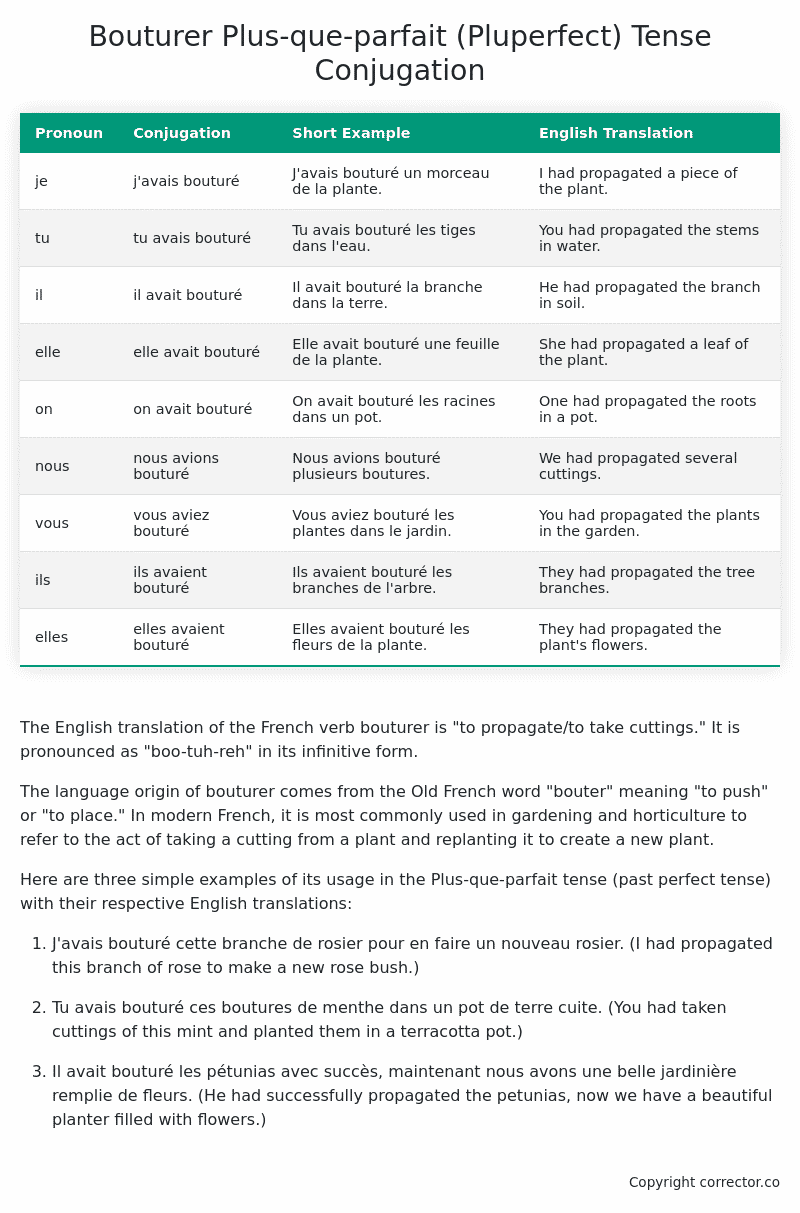Plus-que-parfait (Pluperfect) Tense Conjugation of the French Verb bouturer
Introduction to the verb bouturer
The English translation of the French verb bouturer is “to propagate/to take cuttings.” It is pronounced as “boo-tuh-reh” in its infinitive form.
The language origin of bouturer comes from the Old French word “bouter” meaning “to push” or “to place.” In modern French, it is most commonly used in gardening and horticulture to refer to the act of taking a cutting from a plant and replanting it to create a new plant.
Here are three simple examples of its usage in the Plus-que-parfait tense (past perfect tense) with their respective English translations:
-
J’avais bouturé cette branche de rosier pour en faire un nouveau rosier. (I had propagated this branch of rose to make a new rose bush.)
-
Tu avais bouturé ces boutures de menthe dans un pot de terre cuite. (You had taken cuttings of this mint and planted them in a terracotta pot.)
-
Il avait bouturé les pétunias avec succès, maintenant nous avons une belle jardinière remplie de fleurs. (He had successfully propagated the petunias, now we have a beautiful planter filled with flowers.)
Table of the Plus-que-parfait (Pluperfect) Tense Conjugation of bouturer
| Pronoun | Conjugation | Short Example | English Translation |
|---|---|---|---|
| je | j’avais bouturé | J’avais bouturé un morceau de la plante. | I had propagated a piece of the plant. |
| tu | tu avais bouturé | Tu avais bouturé les tiges dans l’eau. | You had propagated the stems in water. |
| il | il avait bouturé | Il avait bouturé la branche dans la terre. | He had propagated the branch in soil. |
| elle | elle avait bouturé | Elle avait bouturé une feuille de la plante. | She had propagated a leaf of the plant. |
| on | on avait bouturé | On avait bouturé les racines dans un pot. | One had propagated the roots in a pot. |
| nous | nous avions bouturé | Nous avions bouturé plusieurs boutures. | We had propagated several cuttings. |
| vous | vous aviez bouturé | Vous aviez bouturé les plantes dans le jardin. | You had propagated the plants in the garden. |
| ils | ils avaient bouturé | Ils avaient bouturé les branches de l’arbre. | They had propagated the tree branches. |
| elles | elles avaient bouturé | Elles avaient bouturé les fleurs de la plante. | They had propagated the plant’s flowers. |
Other Conjugations for Bouturer.
Le Present (Present Tense) Conjugation of the French Verb bouturer
Imparfait (Imperfect) Tense Conjugation of the French Verb bouturer
Passé Simple (Simple Past) Tense Conjugation of the French Verb bouturer
Passé Composé (Present Perfect) Tense Conjugation of the French Verb bouturer
Futur Simple (Simple Future) Tense Conjugation of the French Verb bouturer
Futur Proche (Near Future) Tense Conjugation of the French Verb bouturer
Plus-que-parfait (Pluperfect) Tense Conjugation of the French Verb bouturer (this article)
Passé Antérieur (Past Anterior) Tense Conjugation of the French Verb bouturer
Futur Antérieur (Future Anterior) Tense Conjugation of the French Verb bouturer
Subjonctif Présent (Subjunctive Present) Tense Conjugation of the French Verb bouturer
Subjonctif Passé (Subjunctive Past) Tense Conjugation of the French Verb bouturer
Subjonctif Imparfait (Subjunctive Imperfect) Tense Conjugation of the French Verb bouturer
Subjonctif Plus-que-parfait (Subjunctive Pluperfect) Tense Conjugation of the French Verb bouturer
Conditionnel Présent (Conditional Present) Tense Conjugation of the French Verb bouturer
Conditionnel Passé (Conditional Past) Tense Conjugation of the French Verb bouturer
L’impératif Présent (Imperative Present) Tense Conjugation of the French Verb bouturer
L’infinitif Présent (Infinitive Present) Tense Conjugation of the French Verb bouturer
Struggling with French verbs or the language in general? Why not use our free French Grammar Checker – no registration required!
Get a FREE Download Study Sheet of this Conjugation 🔥
Simply right click the image below, click “save image” and get your free reference for the bouturer Plus-que-parfait tense conjugation!

Bouturer – About the French Plus-que-parfait (Pluperfect) Tense
Tense Formation
Common everyday usage patterns
Sequencing of past events
Background information
Hypothetical or reported speech
Interactions with other tenses
Summary
I hope you enjoyed this article on the verb bouturer. Still in a learning mood? Check out another TOTALLY random French verb conjugation!


